Organisational Behaviour at Tesco: Culture, Power, Politics Analysis
VerifiedAdded on 2023/06/18
|21
|5573
|484
Report
AI Summary
This report provides an analysis of organisational behaviour, focusing on the impact of culture, power, and politics on individual and team behaviour within the context of Tesco, a multinational general merchandise retailer. It explores the different levels of culture, including the cultural web and Handy's model, and examines the role of organisational power and politics, including different types of power and political behaviours such as sexual harassment. Furthermore, the report discusses various content and process theories of motivation, such as Vroom's expectancy theory and Adams' equity theory, and their application in motivating employees. Finally, it touches upon the concepts and philosophies of organisational behaviour in a business situation, highlighting how culture, power, and politics influence individual and team performance, emphasizing the importance of positive culture and ethical use of power. Desklib provides access to similar solved assignments and study resources for students.
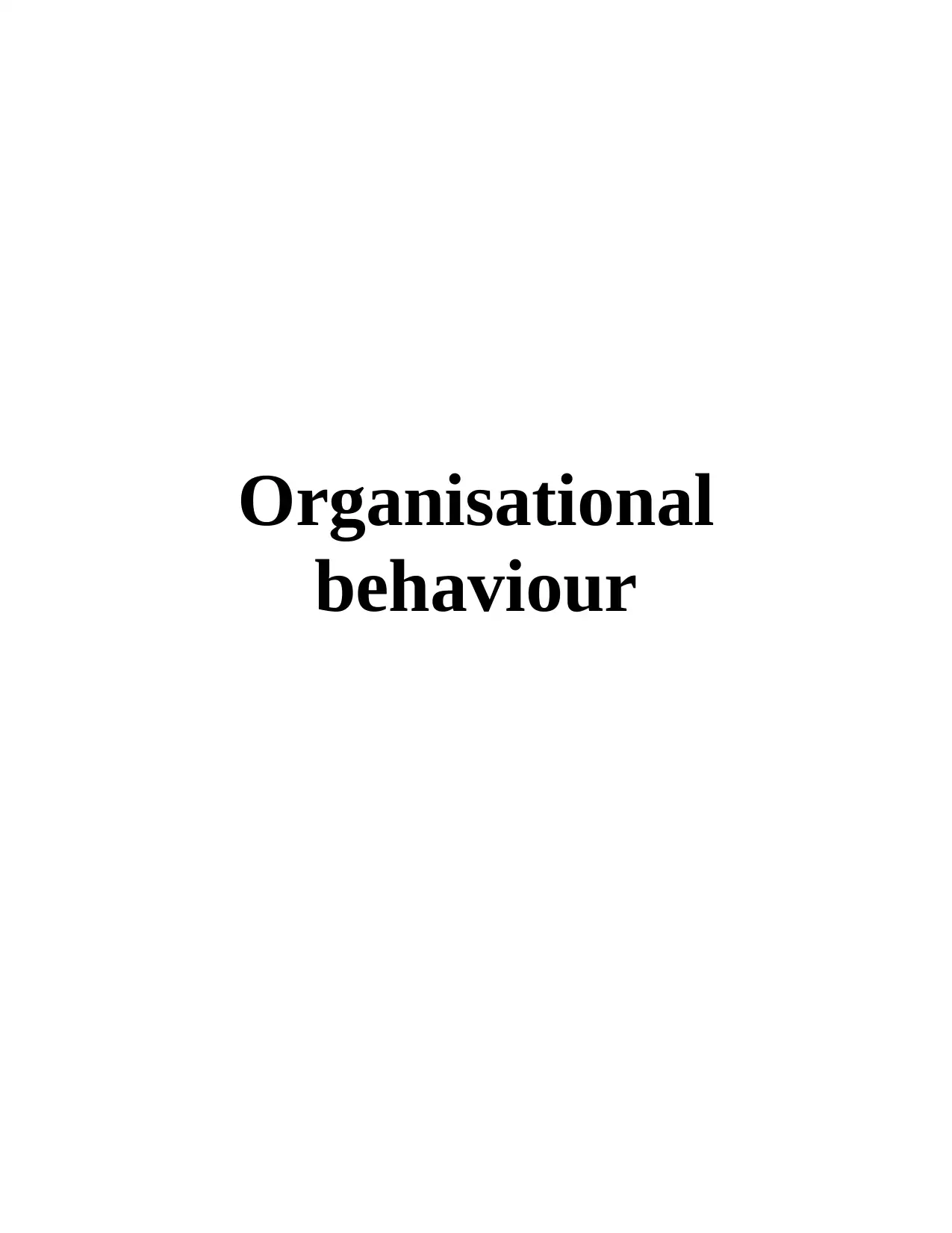
Organisational
behaviour
behaviour
Paraphrase This Document
Need a fresh take? Get an instant paraphrase of this document with our AI Paraphraser
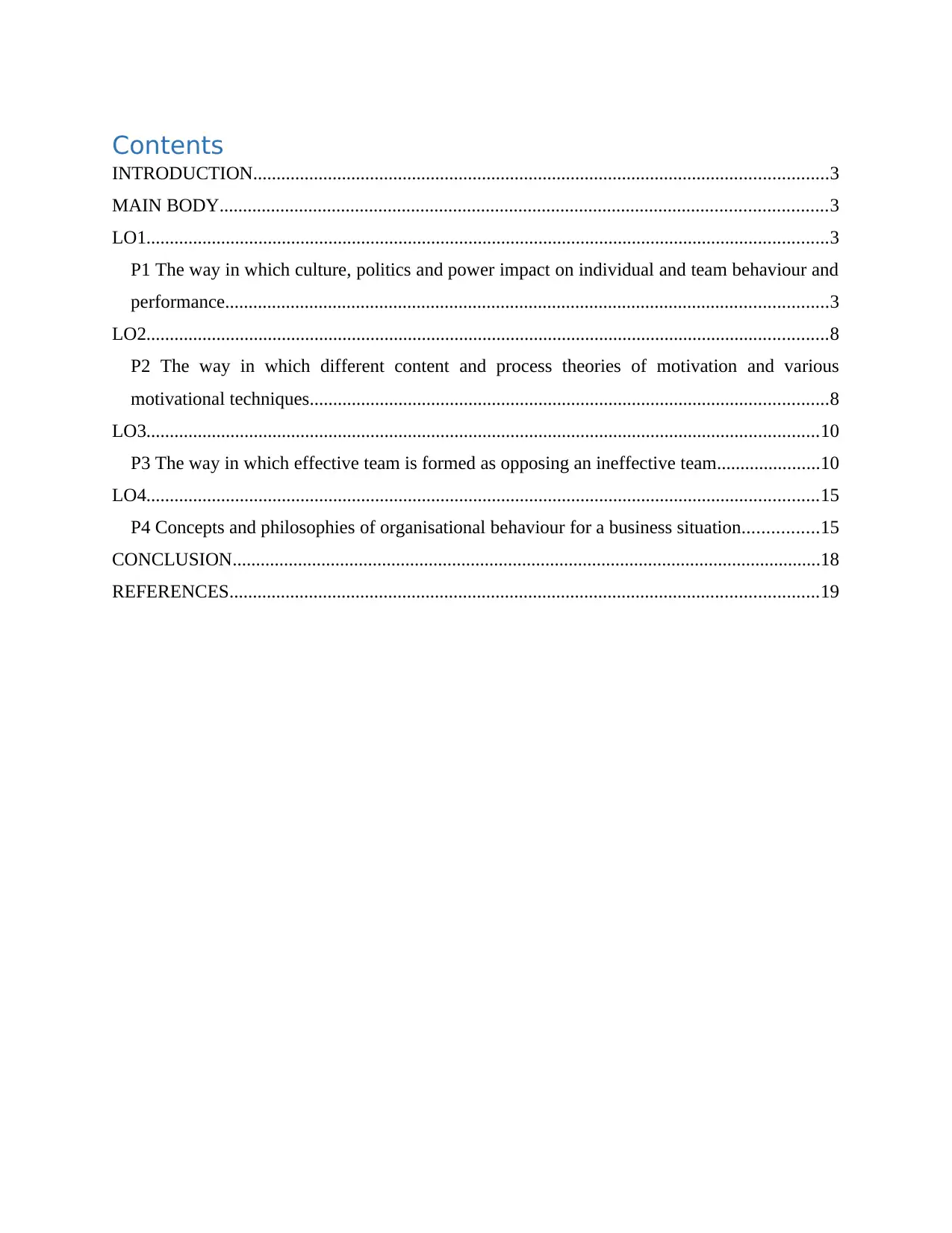
Contents
INTRODUCTION...........................................................................................................................3
MAIN BODY..................................................................................................................................3
LO1..................................................................................................................................................3
P1 The way in which culture, politics and power impact on individual and team behaviour and
performance.................................................................................................................................3
LO2..................................................................................................................................................8
P2 The way in which different content and process theories of motivation and various
motivational techniques...............................................................................................................8
LO3................................................................................................................................................10
P3 The way in which effective team is formed as opposing an ineffective team......................10
LO4................................................................................................................................................15
P4 Concepts and philosophies of organisational behaviour for a business situation................15
CONCLUSION..............................................................................................................................18
REFERENCES..............................................................................................................................19
INTRODUCTION...........................................................................................................................3
MAIN BODY..................................................................................................................................3
LO1..................................................................................................................................................3
P1 The way in which culture, politics and power impact on individual and team behaviour and
performance.................................................................................................................................3
LO2..................................................................................................................................................8
P2 The way in which different content and process theories of motivation and various
motivational techniques...............................................................................................................8
LO3................................................................................................................................................10
P3 The way in which effective team is formed as opposing an ineffective team......................10
LO4................................................................................................................................................15
P4 Concepts and philosophies of organisational behaviour for a business situation................15
CONCLUSION..............................................................................................................................18
REFERENCES..............................................................................................................................19
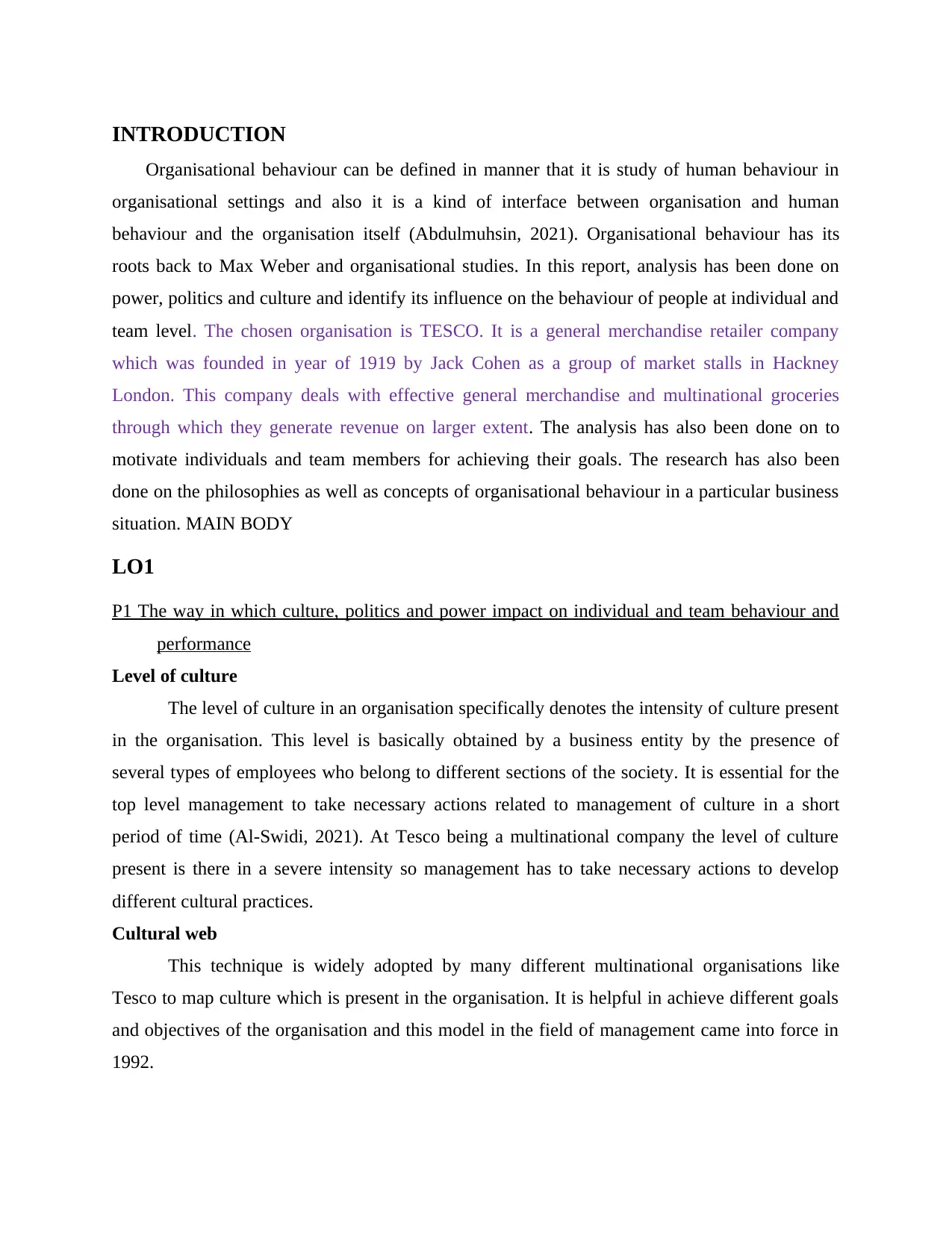
INTRODUCTION
Organisational behaviour can be defined in manner that it is study of human behaviour in
organisational settings and also it is a kind of interface between organisation and human
behaviour and the organisation itself (Abdulmuhsin, 2021). Organisational behaviour has its
roots back to Max Weber and organisational studies. In this report, analysis has been done on
power, politics and culture and identify its influence on the behaviour of people at individual and
team level. The chosen organisation is TESCO. It is a general merchandise retailer company
which was founded in year of 1919 by Jack Cohen as a group of market stalls in Hackney
London. This company deals with effective general merchandise and multinational groceries
through which they generate revenue on larger extent. The analysis has also been done on to
motivate individuals and team members for achieving their goals. The research has also been
done on the philosophies as well as concepts of organisational behaviour in a particular business
situation. MAIN BODY
LO1
P1 The way in which culture, politics and power impact on individual and team behaviour and
performance
Level of culture
The level of culture in an organisation specifically denotes the intensity of culture present
in the organisation. This level is basically obtained by a business entity by the presence of
several types of employees who belong to different sections of the society. It is essential for the
top level management to take necessary actions related to management of culture in a short
period of time (Al-Swidi, 2021). At Tesco being a multinational company the level of culture
present is there in a severe intensity so management has to take necessary actions to develop
different cultural practices.
Cultural web
This technique is widely adopted by many different multinational organisations like
Tesco to map culture which is present in the organisation. It is helpful in achieve different goals
and objectives of the organisation and this model in the field of management came into force in
1992.
Organisational behaviour can be defined in manner that it is study of human behaviour in
organisational settings and also it is a kind of interface between organisation and human
behaviour and the organisation itself (Abdulmuhsin, 2021). Organisational behaviour has its
roots back to Max Weber and organisational studies. In this report, analysis has been done on
power, politics and culture and identify its influence on the behaviour of people at individual and
team level. The chosen organisation is TESCO. It is a general merchandise retailer company
which was founded in year of 1919 by Jack Cohen as a group of market stalls in Hackney
London. This company deals with effective general merchandise and multinational groceries
through which they generate revenue on larger extent. The analysis has also been done on to
motivate individuals and team members for achieving their goals. The research has also been
done on the philosophies as well as concepts of organisational behaviour in a particular business
situation. MAIN BODY
LO1
P1 The way in which culture, politics and power impact on individual and team behaviour and
performance
Level of culture
The level of culture in an organisation specifically denotes the intensity of culture present
in the organisation. This level is basically obtained by a business entity by the presence of
several types of employees who belong to different sections of the society. It is essential for the
top level management to take necessary actions related to management of culture in a short
period of time (Al-Swidi, 2021). At Tesco being a multinational company the level of culture
present is there in a severe intensity so management has to take necessary actions to develop
different cultural practices.
Cultural web
This technique is widely adopted by many different multinational organisations like
Tesco to map culture which is present in the organisation. It is helpful in achieve different goals
and objectives of the organisation and this model in the field of management came into force in
1992.
⊘ This is a preview!⊘
Do you want full access?
Subscribe today to unlock all pages.

Trusted by 1+ million students worldwide
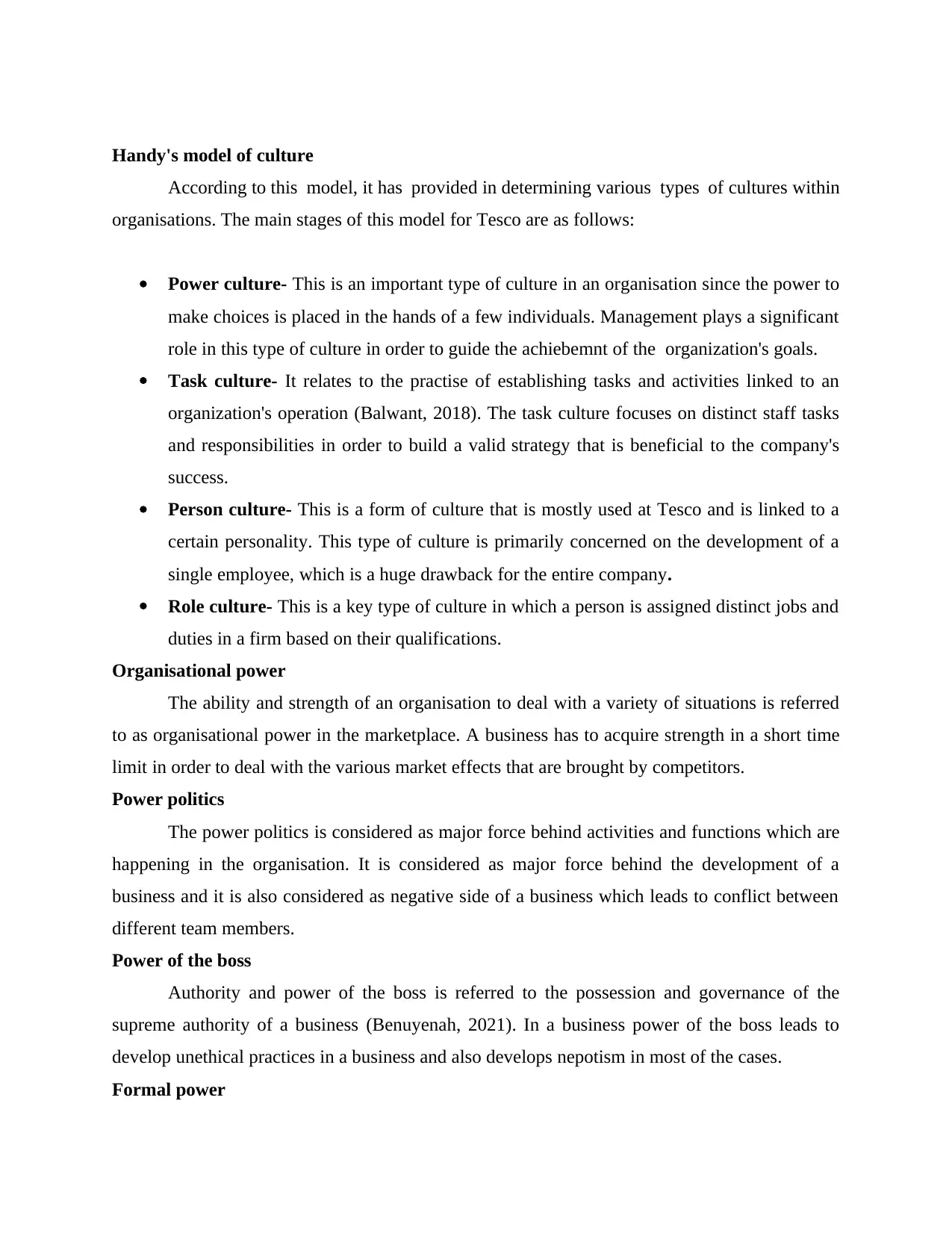
Handy's model of culture
According to this model, it has provided in determining various types of cultures within
organisations. The main stages of this model for Tesco are as follows:
Power culture- This is an important type of culture in an organisation since the power to
make choices is placed in the hands of a few individuals. Management plays a significant
role in this type of culture in order to guide the achiebemnt of the organization's goals.
Task culture- It relates to the practise of establishing tasks and activities linked to an
organization's operation (Balwant, 2018). The task culture focuses on distinct staff tasks
and responsibilities in order to build a valid strategy that is beneficial to the company's
success.
Person culture- This is a form of culture that is mostly used at Tesco and is linked to a
certain personality. This type of culture is primarily concerned on the development of a
single employee, which is a huge drawback for the entire company.
Role culture- This is a key type of culture in which a person is assigned distinct jobs and
duties in a firm based on their qualifications.
Organisational power
The ability and strength of an organisation to deal with a variety of situations is referred
to as organisational power in the marketplace. A business has to acquire strength in a short time
limit in order to deal with the various market effects that are brought by competitors.
Power politics
The power politics is considered as major force behind activities and functions which are
happening in the organisation. It is considered as major force behind the development of a
business and it is also considered as negative side of a business which leads to conflict between
different team members.
Power of the boss
Authority and power of the boss is referred to the possession and governance of the
supreme authority of a business (Benuyenah, 2021). In a business power of the boss leads to
develop unethical practices in a business and also develops nepotism in most of the cases.
Formal power
According to this model, it has provided in determining various types of cultures within
organisations. The main stages of this model for Tesco are as follows:
Power culture- This is an important type of culture in an organisation since the power to
make choices is placed in the hands of a few individuals. Management plays a significant
role in this type of culture in order to guide the achiebemnt of the organization's goals.
Task culture- It relates to the practise of establishing tasks and activities linked to an
organization's operation (Balwant, 2018). The task culture focuses on distinct staff tasks
and responsibilities in order to build a valid strategy that is beneficial to the company's
success.
Person culture- This is a form of culture that is mostly used at Tesco and is linked to a
certain personality. This type of culture is primarily concerned on the development of a
single employee, which is a huge drawback for the entire company.
Role culture- This is a key type of culture in which a person is assigned distinct jobs and
duties in a firm based on their qualifications.
Organisational power
The ability and strength of an organisation to deal with a variety of situations is referred
to as organisational power in the marketplace. A business has to acquire strength in a short time
limit in order to deal with the various market effects that are brought by competitors.
Power politics
The power politics is considered as major force behind activities and functions which are
happening in the organisation. It is considered as major force behind the development of a
business and it is also considered as negative side of a business which leads to conflict between
different team members.
Power of the boss
Authority and power of the boss is referred to the possession and governance of the
supreme authority of a business (Benuyenah, 2021). In a business power of the boss leads to
develop unethical practices in a business and also develops nepotism in most of the cases.
Formal power
Paraphrase This Document
Need a fresh take? Get an instant paraphrase of this document with our AI Paraphraser
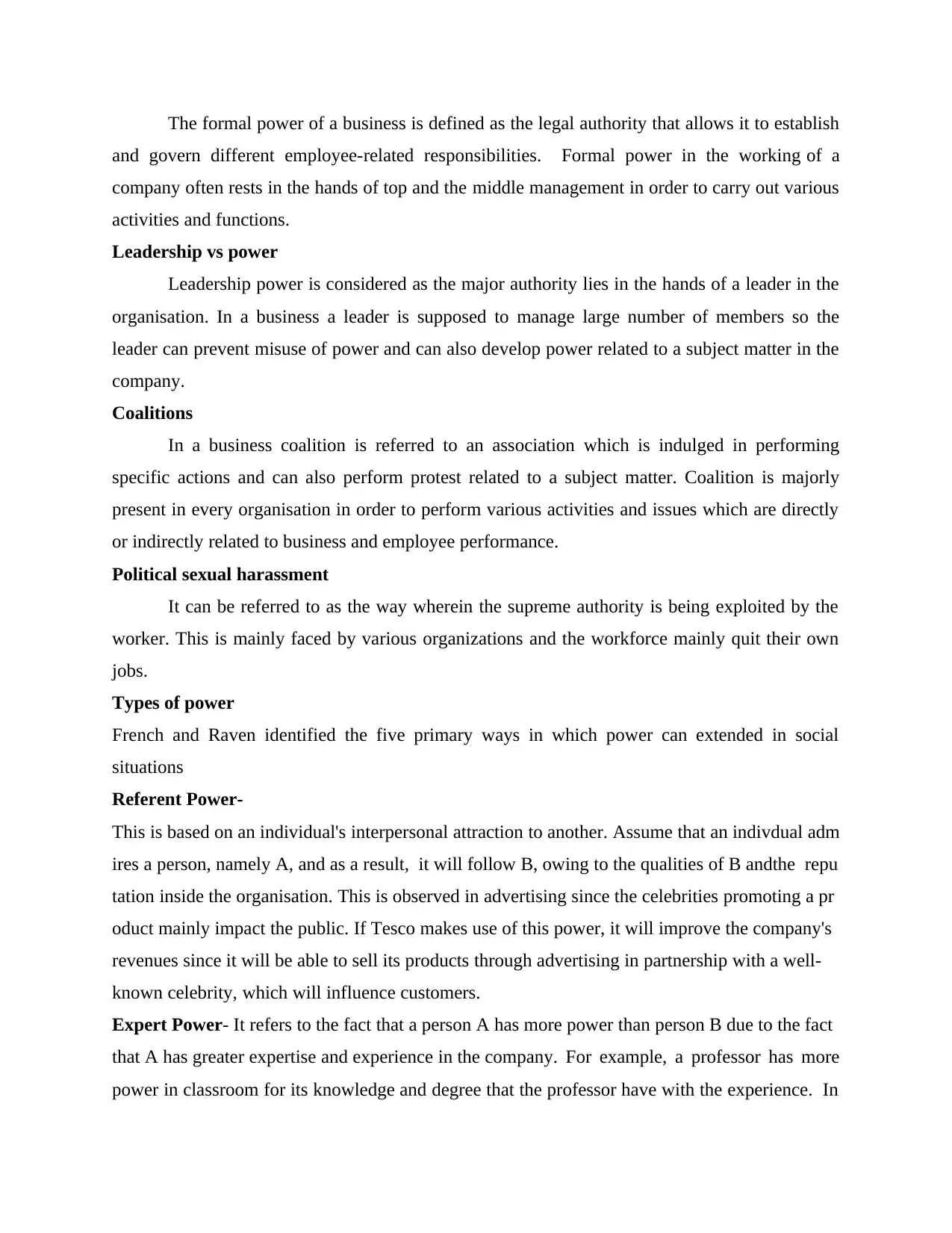
The formal power of a business is defined as the legal authority that allows it to establish
and govern different employee-related responsibilities. Formal power in the working of a
company often rests in the hands of top and the middle management in order to carry out various
activities and functions.
Leadership vs power
Leadership power is considered as the major authority lies in the hands of a leader in the
organisation. In a business a leader is supposed to manage large number of members so the
leader can prevent misuse of power and can also develop power related to a subject matter in the
company.
Coalitions
In a business coalition is referred to an association which is indulged in performing
specific actions and can also perform protest related to a subject matter. Coalition is majorly
present in every organisation in order to perform various activities and issues which are directly
or indirectly related to business and employee performance.
Political sexual harassment
It can be referred to as the way wherein the supreme authority is being exploited by the
worker. This is mainly faced by various organizations and the workforce mainly quit their own
jobs.
Types of power
French and Raven identified the five primary ways in which power can extended in social
situations
Referent Power-
This is based on an individual's interpersonal attraction to another. Assume that an indivdual adm
ires a person, namely A, and as a result, it will follow B, owing to the qualities of B andthe repu
tation inside the organisation. This is observed in advertising since the celebrities promoting a pr
oduct mainly impact the public. If Tesco makes use of this power, it will improve the company's
revenues since it will be able to sell its products through advertising in partnership with a well-
known celebrity, which will influence customers.
Expert Power- It refers to the fact that a person A has more power than person B due to the fact
that A has greater expertise and experience in the company. For example, a professor has more
power in classroom for its knowledge and degree that the professor have with the experience. In
and govern different employee-related responsibilities. Formal power in the working of a
company often rests in the hands of top and the middle management in order to carry out various
activities and functions.
Leadership vs power
Leadership power is considered as the major authority lies in the hands of a leader in the
organisation. In a business a leader is supposed to manage large number of members so the
leader can prevent misuse of power and can also develop power related to a subject matter in the
company.
Coalitions
In a business coalition is referred to an association which is indulged in performing
specific actions and can also perform protest related to a subject matter. Coalition is majorly
present in every organisation in order to perform various activities and issues which are directly
or indirectly related to business and employee performance.
Political sexual harassment
It can be referred to as the way wherein the supreme authority is being exploited by the
worker. This is mainly faced by various organizations and the workforce mainly quit their own
jobs.
Types of power
French and Raven identified the five primary ways in which power can extended in social
situations
Referent Power-
This is based on an individual's interpersonal attraction to another. Assume that an indivdual adm
ires a person, namely A, and as a result, it will follow B, owing to the qualities of B andthe repu
tation inside the organisation. This is observed in advertising since the celebrities promoting a pr
oduct mainly impact the public. If Tesco makes use of this power, it will improve the company's
revenues since it will be able to sell its products through advertising in partnership with a well-
known celebrity, which will influence customers.
Expert Power- It refers to the fact that a person A has more power than person B due to the fact
that A has greater expertise and experience in the company. For example, a professor has more
power in classroom for its knowledge and degree that the professor have with the experience. In
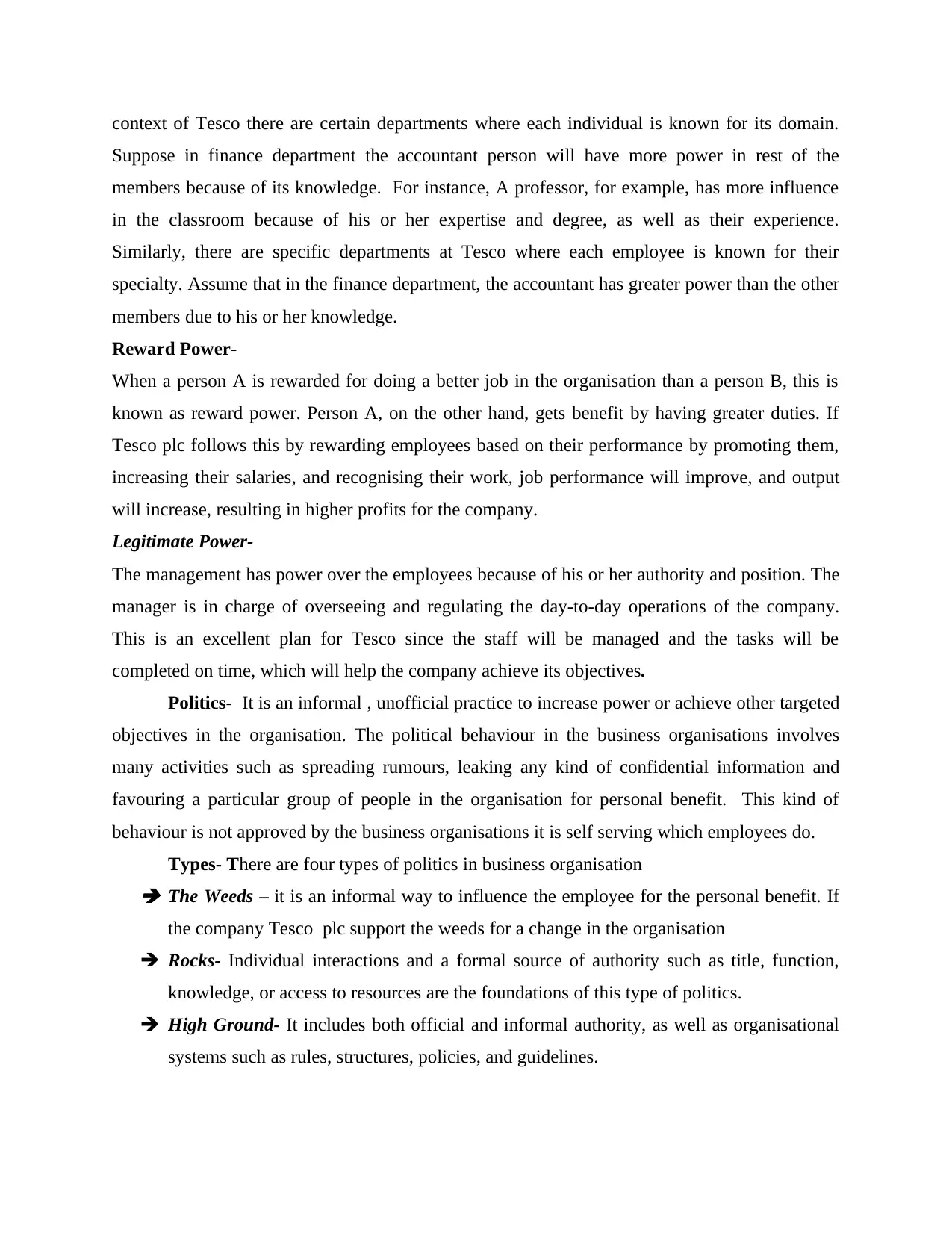
context of Tesco there are certain departments where each individual is known for its domain.
Suppose in finance department the accountant person will have more power in rest of the
members because of its knowledge. For instance, A professor, for example, has more influence
in the classroom because of his or her expertise and degree, as well as their experience.
Similarly, there are specific departments at Tesco where each employee is known for their
specialty. Assume that in the finance department, the accountant has greater power than the other
members due to his or her knowledge.
Reward Power-
When a person A is rewarded for doing a better job in the organisation than a person B, this is
known as reward power. Person A, on the other hand, gets benefit by having greater duties. If
Tesco plc follows this by rewarding employees based on their performance by promoting them,
increasing their salaries, and recognising their work, job performance will improve, and output
will increase, resulting in higher profits for the company.
Legitimate Power-
The management has power over the employees because of his or her authority and position. The
manager is in charge of overseeing and regulating the day-to-day operations of the company.
This is an excellent plan for Tesco since the staff will be managed and the tasks will be
completed on time, which will help the company achieve its objectives.
Politics- It is an informal , unofficial practice to increase power or achieve other targeted
objectives in the organisation. The political behaviour in the business organisations involves
many activities such as spreading rumours, leaking any kind of confidential information and
favouring a particular group of people in the organisation for personal benefit. This kind of
behaviour is not approved by the business organisations it is self serving which employees do.
Types- There are four types of politics in business organisation The Weeds – it is an informal way to influence the employee for the personal benefit. If
the company Tesco plc support the weeds for a change in the organisation
Rocks- Individual interactions and a formal source of authority such as title, function,
knowledge, or access to resources are the foundations of this type of politics.
High Ground- It includes both official and informal authority, as well as organisational
systems such as rules, structures, policies, and guidelines.
Suppose in finance department the accountant person will have more power in rest of the
members because of its knowledge. For instance, A professor, for example, has more influence
in the classroom because of his or her expertise and degree, as well as their experience.
Similarly, there are specific departments at Tesco where each employee is known for their
specialty. Assume that in the finance department, the accountant has greater power than the other
members due to his or her knowledge.
Reward Power-
When a person A is rewarded for doing a better job in the organisation than a person B, this is
known as reward power. Person A, on the other hand, gets benefit by having greater duties. If
Tesco plc follows this by rewarding employees based on their performance by promoting them,
increasing their salaries, and recognising their work, job performance will improve, and output
will increase, resulting in higher profits for the company.
Legitimate Power-
The management has power over the employees because of his or her authority and position. The
manager is in charge of overseeing and regulating the day-to-day operations of the company.
This is an excellent plan for Tesco since the staff will be managed and the tasks will be
completed on time, which will help the company achieve its objectives.
Politics- It is an informal , unofficial practice to increase power or achieve other targeted
objectives in the organisation. The political behaviour in the business organisations involves
many activities such as spreading rumours, leaking any kind of confidential information and
favouring a particular group of people in the organisation for personal benefit. This kind of
behaviour is not approved by the business organisations it is self serving which employees do.
Types- There are four types of politics in business organisation The Weeds – it is an informal way to influence the employee for the personal benefit. If
the company Tesco plc support the weeds for a change in the organisation
Rocks- Individual interactions and a formal source of authority such as title, function,
knowledge, or access to resources are the foundations of this type of politics.
High Ground- It includes both official and informal authority, as well as organisational
systems such as rules, structures, policies, and guidelines.
⊘ This is a preview!⊘
Do you want full access?
Subscribe today to unlock all pages.

Trusted by 1+ million students worldwide
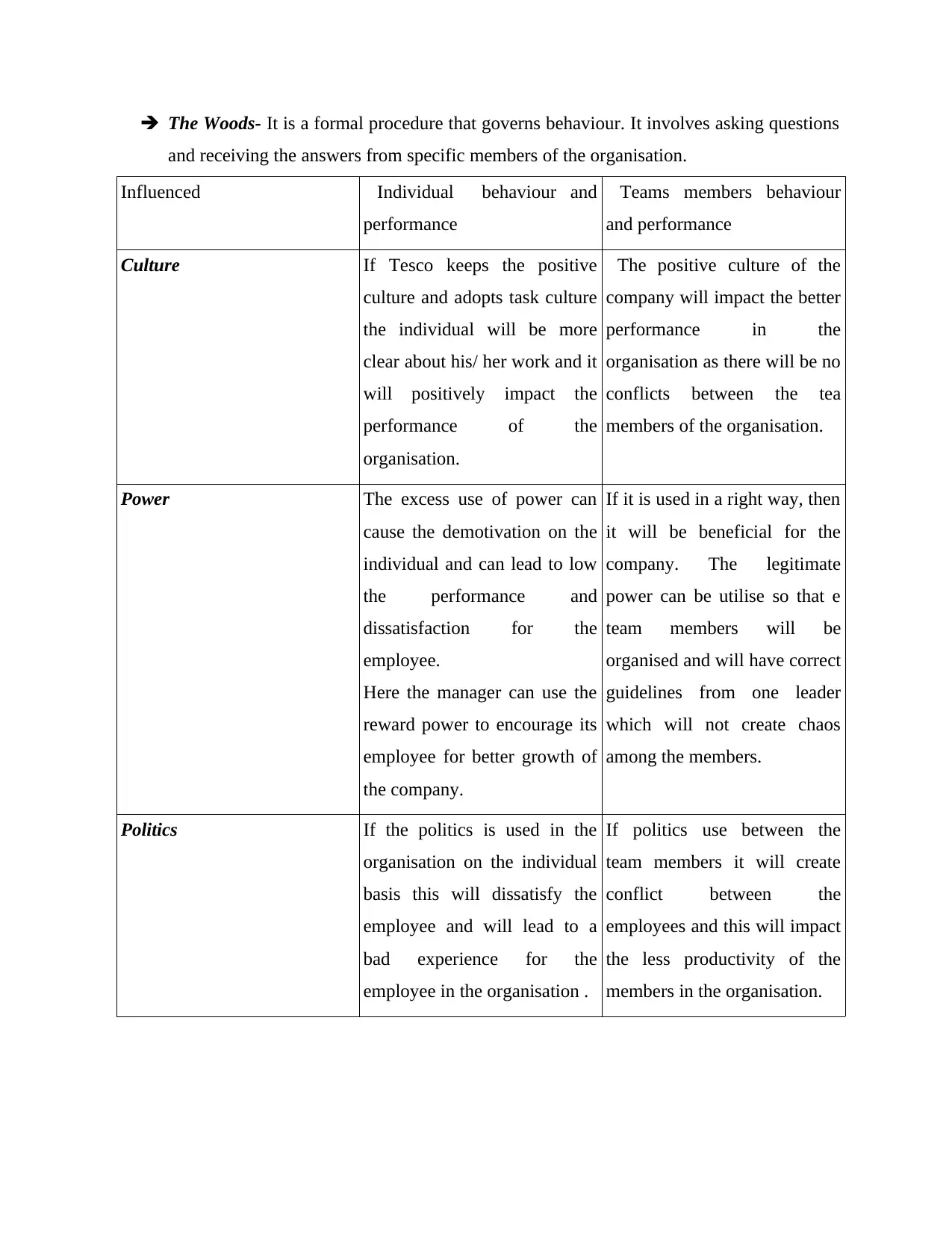
The Woods- It is a formal procedure that governs behaviour. It involves asking questions
and receiving the answers from specific members of the organisation.
Influenced Individual behaviour and
performance
Teams members behaviour
and performance
Culture If Tesco keeps the positive
culture and adopts task culture
the individual will be more
clear about his/ her work and it
will positively impact the
performance of the
organisation.
The positive culture of the
company will impact the better
performance in the
organisation as there will be no
conflicts between the tea
members of the organisation.
Power The excess use of power can
cause the demotivation on the
individual and can lead to low
the performance and
dissatisfaction for the
employee.
Here the manager can use the
reward power to encourage its
employee for better growth of
the company.
If it is used in a right way, then
it will be beneficial for the
company. The legitimate
power can be utilise so that e
team members will be
organised and will have correct
guidelines from one leader
which will not create chaos
among the members.
Politics If the politics is used in the
organisation on the individual
basis this will dissatisfy the
employee and will lead to a
bad experience for the
employee in the organisation .
If politics use between the
team members it will create
conflict between the
employees and this will impact
the less productivity of the
members in the organisation.
and receiving the answers from specific members of the organisation.
Influenced Individual behaviour and
performance
Teams members behaviour
and performance
Culture If Tesco keeps the positive
culture and adopts task culture
the individual will be more
clear about his/ her work and it
will positively impact the
performance of the
organisation.
The positive culture of the
company will impact the better
performance in the
organisation as there will be no
conflicts between the tea
members of the organisation.
Power The excess use of power can
cause the demotivation on the
individual and can lead to low
the performance and
dissatisfaction for the
employee.
Here the manager can use the
reward power to encourage its
employee for better growth of
the company.
If it is used in a right way, then
it will be beneficial for the
company. The legitimate
power can be utilise so that e
team members will be
organised and will have correct
guidelines from one leader
which will not create chaos
among the members.
Politics If the politics is used in the
organisation on the individual
basis this will dissatisfy the
employee and will lead to a
bad experience for the
employee in the organisation .
If politics use between the
team members it will create
conflict between the
employees and this will impact
the less productivity of the
members in the organisation.
Paraphrase This Document
Need a fresh take? Get an instant paraphrase of this document with our AI Paraphraser
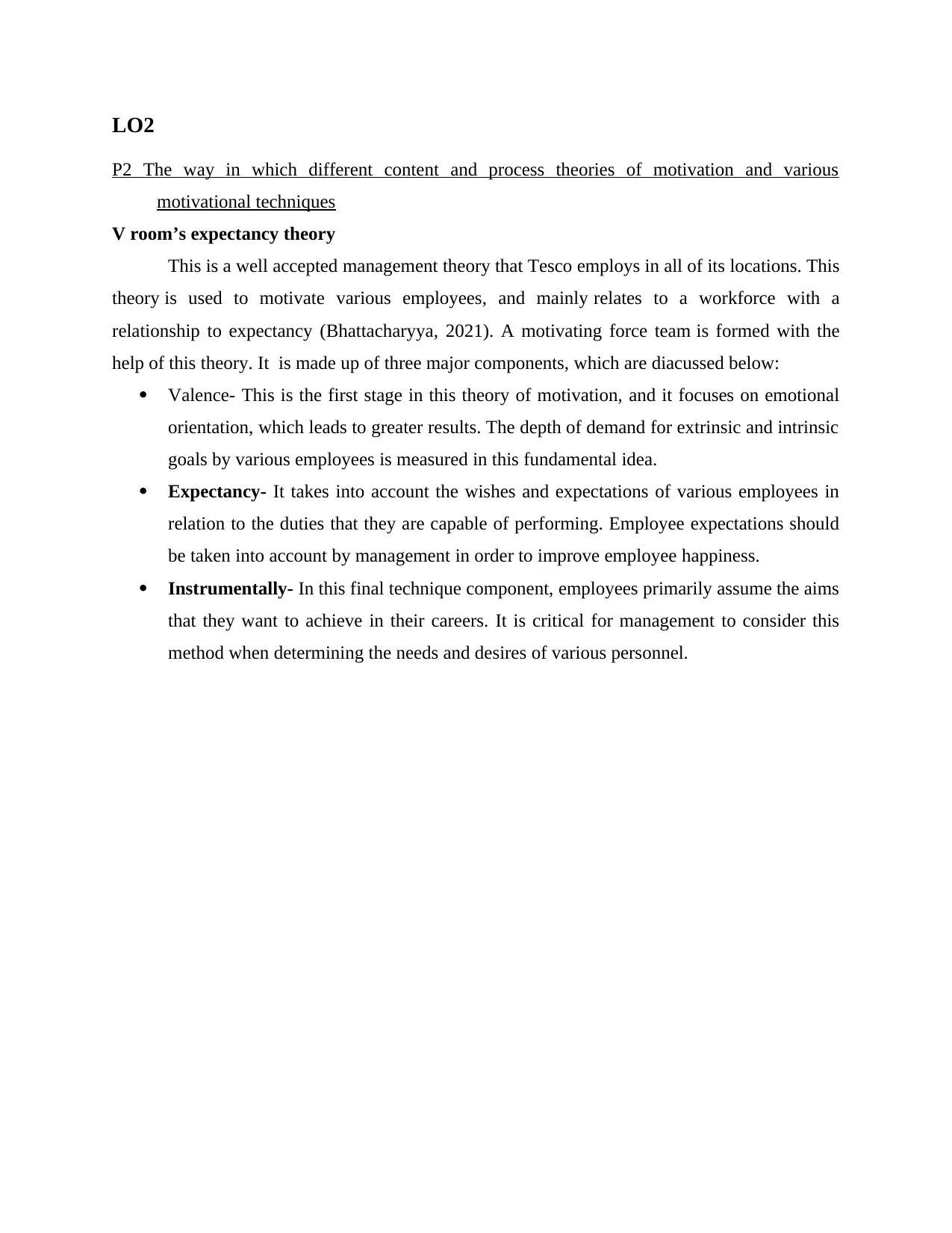
LO2
P2 The way in which different content and process theories of motivation and various
motivational techniques
V room’s expectancy theory
This is a well accepted management theory that Tesco employs in all of its locations. This
theory is used to motivate various employees, and mainly relates to a workforce with a
relationship to expectancy (Bhattacharyya, 2021). A motivating force team is formed with the
help of this theory. It is made up of three major components, which are diacussed below:
Valence- This is the first stage in this theory of motivation, and it focuses on emotional
orientation, which leads to greater results. The depth of demand for extrinsic and intrinsic
goals by various employees is measured in this fundamental idea.
Expectancy- It takes into account the wishes and expectations of various employees in
relation to the duties that they are capable of performing. Employee expectations should
be taken into account by management in order to improve employee happiness.
Instrumentally- In this final technique component, employees primarily assume the aims
that they want to achieve in their careers. It is critical for management to consider this
method when determining the needs and desires of various personnel.
P2 The way in which different content and process theories of motivation and various
motivational techniques
V room’s expectancy theory
This is a well accepted management theory that Tesco employs in all of its locations. This
theory is used to motivate various employees, and mainly relates to a workforce with a
relationship to expectancy (Bhattacharyya, 2021). A motivating force team is formed with the
help of this theory. It is made up of three major components, which are diacussed below:
Valence- This is the first stage in this theory of motivation, and it focuses on emotional
orientation, which leads to greater results. The depth of demand for extrinsic and intrinsic
goals by various employees is measured in this fundamental idea.
Expectancy- It takes into account the wishes and expectations of various employees in
relation to the duties that they are capable of performing. Employee expectations should
be taken into account by management in order to improve employee happiness.
Instrumentally- In this final technique component, employees primarily assume the aims
that they want to achieve in their careers. It is critical for management to consider this
method when determining the needs and desires of various personnel.
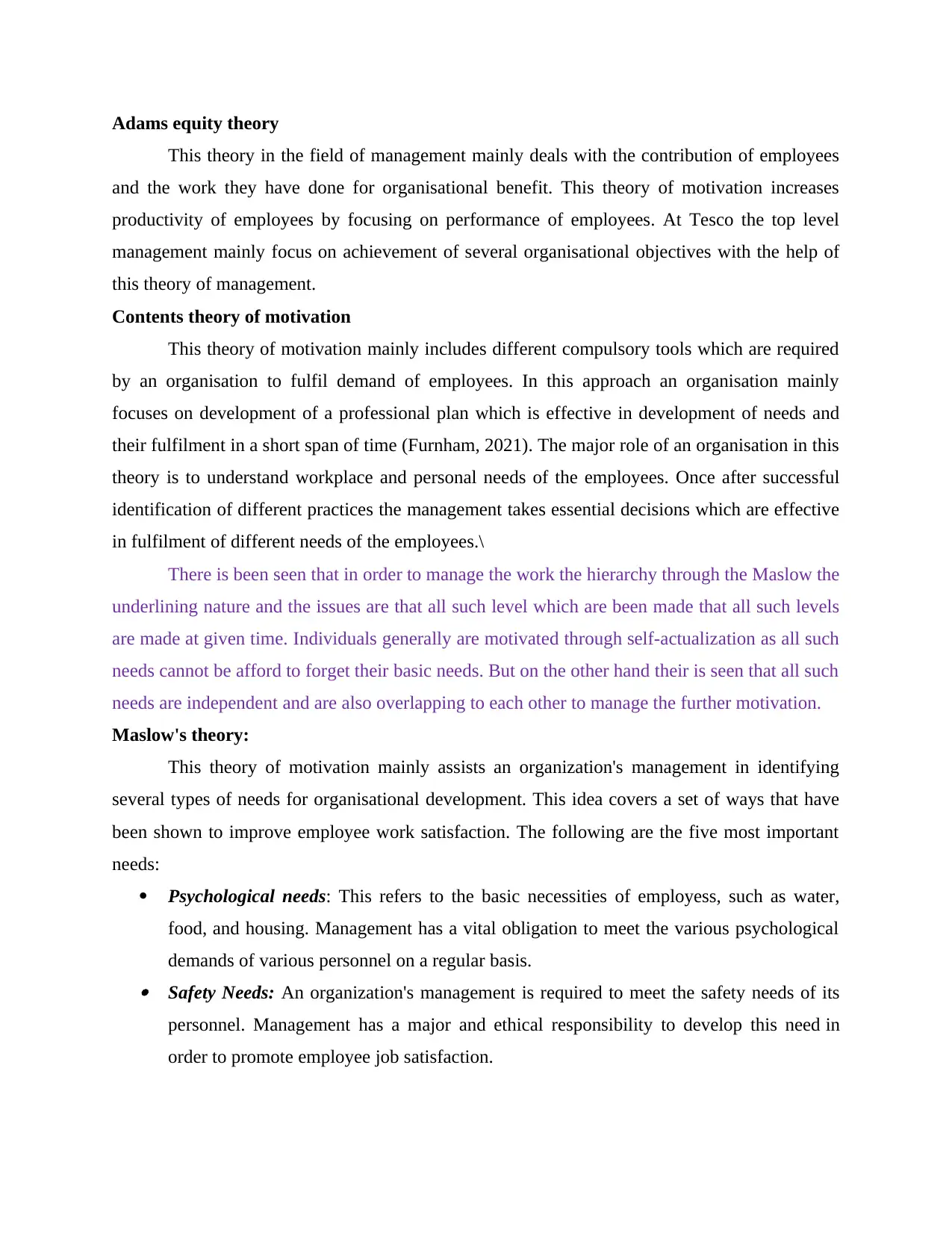
Adams equity theory
This theory in the field of management mainly deals with the contribution of employees
and the work they have done for organisational benefit. This theory of motivation increases
productivity of employees by focusing on performance of employees. At Tesco the top level
management mainly focus on achievement of several organisational objectives with the help of
this theory of management.
Contents theory of motivation
This theory of motivation mainly includes different compulsory tools which are required
by an organisation to fulfil demand of employees. In this approach an organisation mainly
focuses on development of a professional plan which is effective in development of needs and
their fulfilment in a short span of time (Furnham, 2021). The major role of an organisation in this
theory is to understand workplace and personal needs of the employees. Once after successful
identification of different practices the management takes essential decisions which are effective
in fulfilment of different needs of the employees.\
There is been seen that in order to manage the work the hierarchy through the Maslow the
underlining nature and the issues are that all such level which are been made that all such levels
are made at given time. Individuals generally are motivated through self-actualization as all such
needs cannot be afford to forget their basic needs. But on the other hand their is seen that all such
needs are independent and are also overlapping to each other to manage the further motivation.
Maslow's theory:
This theory of motivation mainly assists an organization's management in identifying
several types of needs for organisational development. This idea covers a set of ways that have
been shown to improve employee work satisfaction. The following are the five most important
needs:
Psychological needs: This refers to the basic necessities of employess, such as water,
food, and housing. Management has a vital obligation to meet the various psychological
demands of various personnel on a regular basis. Safety Needs: An organization's management is required to meet the safety needs of its
personnel. Management has a major and ethical responsibility to develop this need in
order to promote employee job satisfaction.
This theory in the field of management mainly deals with the contribution of employees
and the work they have done for organisational benefit. This theory of motivation increases
productivity of employees by focusing on performance of employees. At Tesco the top level
management mainly focus on achievement of several organisational objectives with the help of
this theory of management.
Contents theory of motivation
This theory of motivation mainly includes different compulsory tools which are required
by an organisation to fulfil demand of employees. In this approach an organisation mainly
focuses on development of a professional plan which is effective in development of needs and
their fulfilment in a short span of time (Furnham, 2021). The major role of an organisation in this
theory is to understand workplace and personal needs of the employees. Once after successful
identification of different practices the management takes essential decisions which are effective
in fulfilment of different needs of the employees.\
There is been seen that in order to manage the work the hierarchy through the Maslow the
underlining nature and the issues are that all such level which are been made that all such levels
are made at given time. Individuals generally are motivated through self-actualization as all such
needs cannot be afford to forget their basic needs. But on the other hand their is seen that all such
needs are independent and are also overlapping to each other to manage the further motivation.
Maslow's theory:
This theory of motivation mainly assists an organization's management in identifying
several types of needs for organisational development. This idea covers a set of ways that have
been shown to improve employee work satisfaction. The following are the five most important
needs:
Psychological needs: This refers to the basic necessities of employess, such as water,
food, and housing. Management has a vital obligation to meet the various psychological
demands of various personnel on a regular basis. Safety Needs: An organization's management is required to meet the safety needs of its
personnel. Management has a major and ethical responsibility to develop this need in
order to promote employee job satisfaction.
⊘ This is a preview!⊘
Do you want full access?
Subscribe today to unlock all pages.

Trusted by 1+ million students worldwide
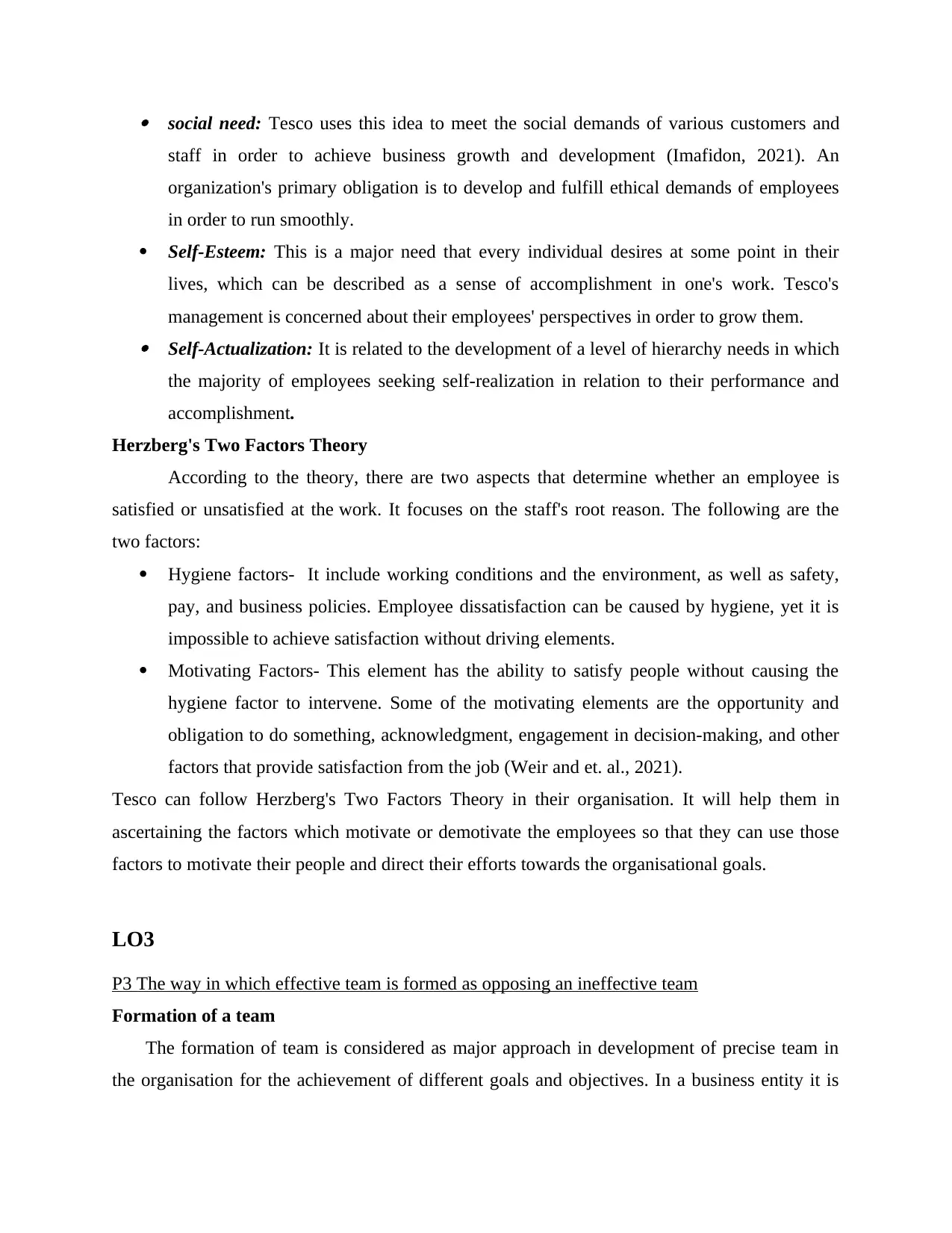
social need: Tesco uses this idea to meet the social demands of various customers and
staff in order to achieve business growth and development (Imafidon, 2021). An
organization's primary obligation is to develop and fulfill ethical demands of employees
in order to run smoothly.
Self-Esteem: This is a major need that every individual desires at some point in their
lives, which can be described as a sense of accomplishment in one's work. Tesco's
management is concerned about their employees' perspectives in order to grow them. Self-Actualization: It is related to the development of a level of hierarchy needs in which
the majority of employees seeking self-realization in relation to their performance and
accomplishment.
Herzberg's Two Factors Theory
According to the theory, there are two aspects that determine whether an employee is
satisfied or unsatisfied at the work. It focuses on the staff's root reason. The following are the
two factors:
Hygiene factors- It include working conditions and the environment, as well as safety,
pay, and business policies. Employee dissatisfaction can be caused by hygiene, yet it is
impossible to achieve satisfaction without driving elements.
Motivating Factors- This element has the ability to satisfy people without causing the
hygiene factor to intervene. Some of the motivating elements are the opportunity and
obligation to do something, acknowledgment, engagement in decision-making, and other
factors that provide satisfaction from the job (Weir and et. al., 2021).
Tesco can follow Herzberg's Two Factors Theory in their organisation. It will help them in
ascertaining the factors which motivate or demotivate the employees so that they can use those
factors to motivate their people and direct their efforts towards the organisational goals.
LO3
P3 The way in which effective team is formed as opposing an ineffective team
Formation of a team
The formation of team is considered as major approach in development of precise team in
the organisation for the achievement of different goals and objectives. In a business entity it is
staff in order to achieve business growth and development (Imafidon, 2021). An
organization's primary obligation is to develop and fulfill ethical demands of employees
in order to run smoothly.
Self-Esteem: This is a major need that every individual desires at some point in their
lives, which can be described as a sense of accomplishment in one's work. Tesco's
management is concerned about their employees' perspectives in order to grow them. Self-Actualization: It is related to the development of a level of hierarchy needs in which
the majority of employees seeking self-realization in relation to their performance and
accomplishment.
Herzberg's Two Factors Theory
According to the theory, there are two aspects that determine whether an employee is
satisfied or unsatisfied at the work. It focuses on the staff's root reason. The following are the
two factors:
Hygiene factors- It include working conditions and the environment, as well as safety,
pay, and business policies. Employee dissatisfaction can be caused by hygiene, yet it is
impossible to achieve satisfaction without driving elements.
Motivating Factors- This element has the ability to satisfy people without causing the
hygiene factor to intervene. Some of the motivating elements are the opportunity and
obligation to do something, acknowledgment, engagement in decision-making, and other
factors that provide satisfaction from the job (Weir and et. al., 2021).
Tesco can follow Herzberg's Two Factors Theory in their organisation. It will help them in
ascertaining the factors which motivate or demotivate the employees so that they can use those
factors to motivate their people and direct their efforts towards the organisational goals.
LO3
P3 The way in which effective team is formed as opposing an ineffective team
Formation of a team
The formation of team is considered as major approach in development of precise team in
the organisation for the achievement of different goals and objectives. In a business entity it is
Paraphrase This Document
Need a fresh take? Get an instant paraphrase of this document with our AI Paraphraser
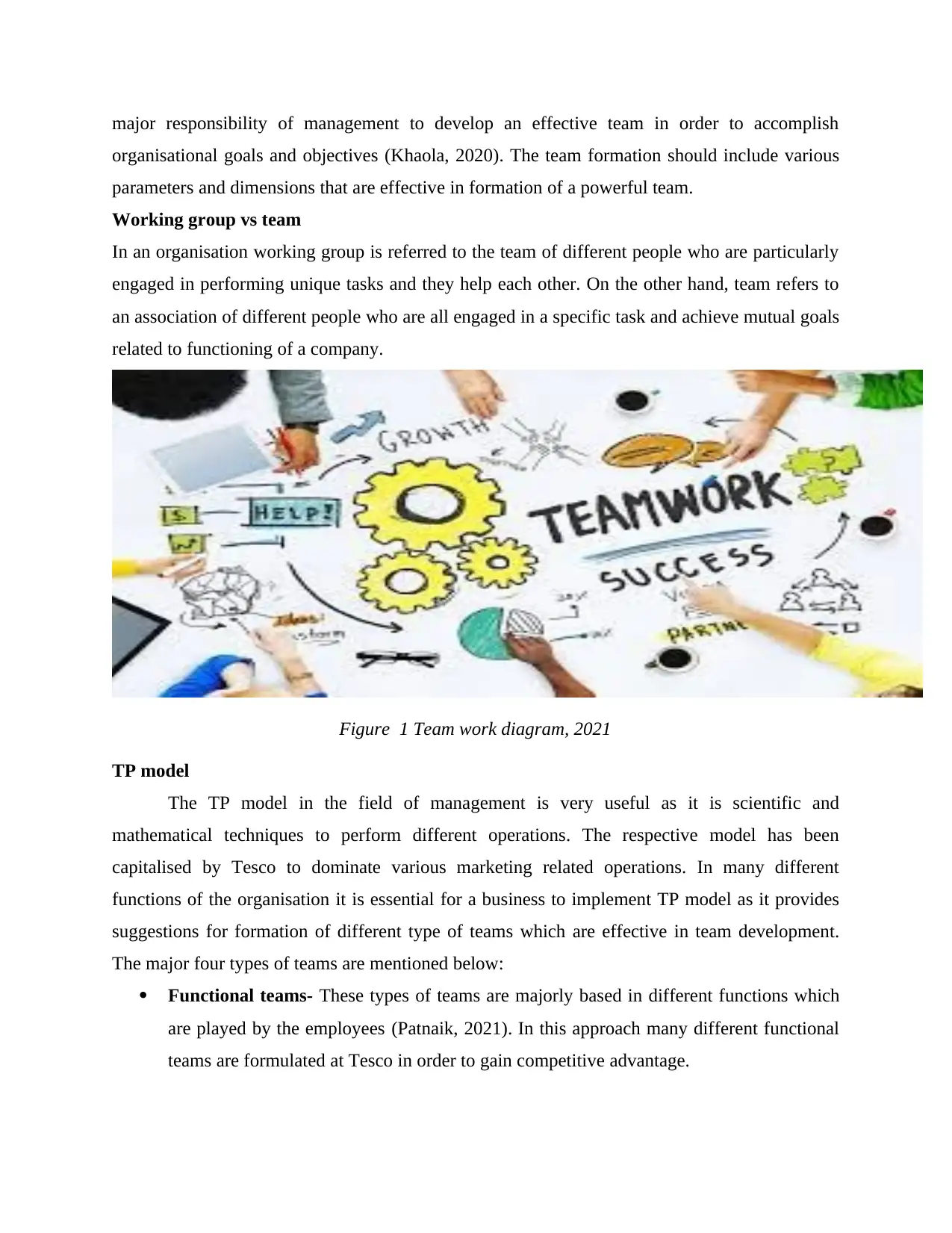
major responsibility of management to develop an effective team in order to accomplish
organisational goals and objectives (Khaola, 2020). The team formation should include various
parameters and dimensions that are effective in formation of a powerful team.
Working group vs team
In an organisation working group is referred to the team of different people who are particularly
engaged in performing unique tasks and they help each other. On the other hand, team refers to
an association of different people who are all engaged in a specific task and achieve mutual goals
related to functioning of a company.
Figure 1 Team work diagram, 2021
TP model
The TP model in the field of management is very useful as it is scientific and
mathematical techniques to perform different operations. The respective model has been
capitalised by Tesco to dominate various marketing related operations. In many different
functions of the organisation it is essential for a business to implement TP model as it provides
suggestions for formation of different type of teams which are effective in team development.
The major four types of teams are mentioned below:
Functional teams- These types of teams are majorly based in different functions which
are played by the employees (Patnaik, 2021). In this approach many different functional
teams are formulated at Tesco in order to gain competitive advantage.
organisational goals and objectives (Khaola, 2020). The team formation should include various
parameters and dimensions that are effective in formation of a powerful team.
Working group vs team
In an organisation working group is referred to the team of different people who are particularly
engaged in performing unique tasks and they help each other. On the other hand, team refers to
an association of different people who are all engaged in a specific task and achieve mutual goals
related to functioning of a company.
Figure 1 Team work diagram, 2021
TP model
The TP model in the field of management is very useful as it is scientific and
mathematical techniques to perform different operations. The respective model has been
capitalised by Tesco to dominate various marketing related operations. In many different
functions of the organisation it is essential for a business to implement TP model as it provides
suggestions for formation of different type of teams which are effective in team development.
The major four types of teams are mentioned below:
Functional teams- These types of teams are majorly based in different functions which
are played by the employees (Patnaik, 2021). In this approach many different functional
teams are formulated at Tesco in order to gain competitive advantage.
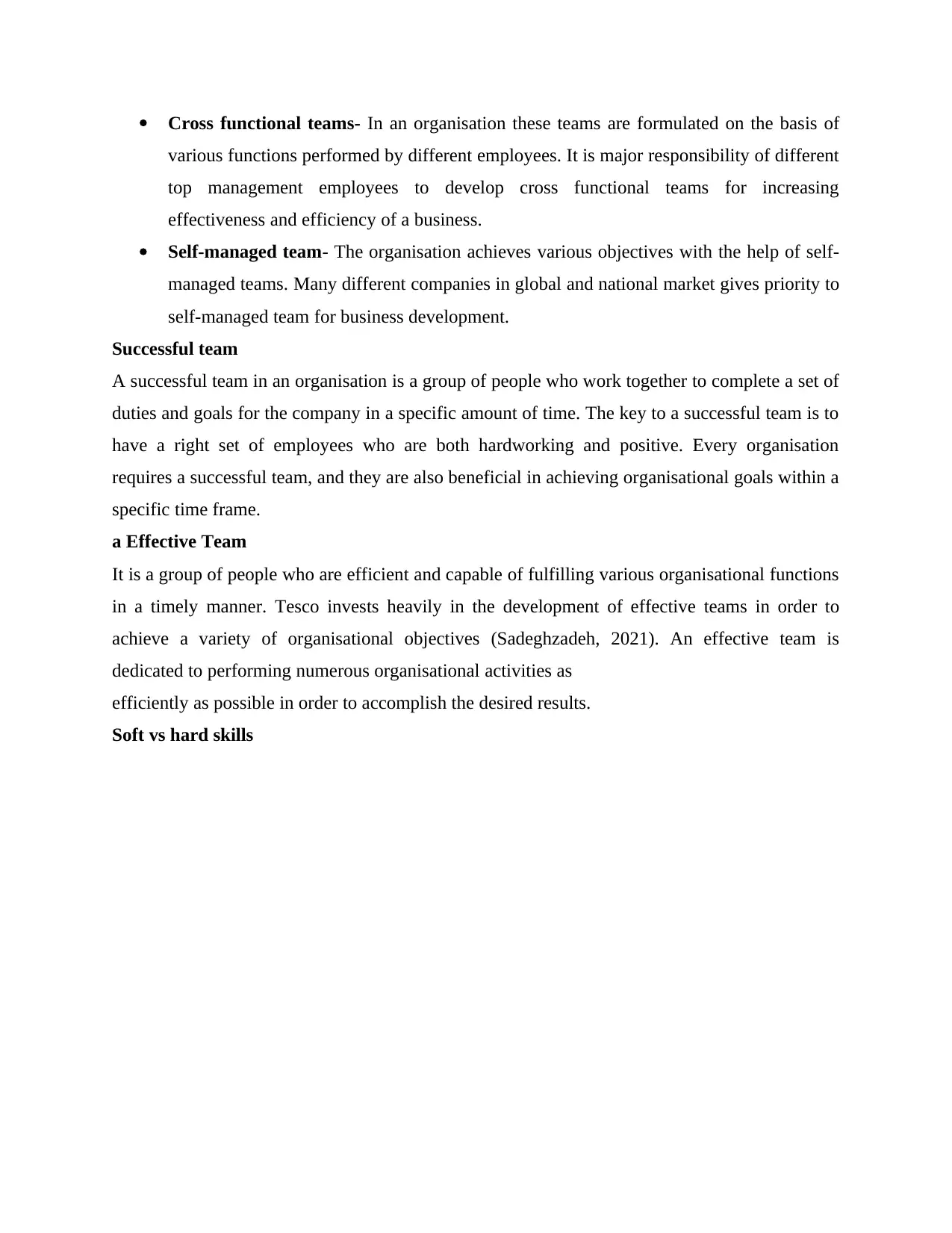
Cross functional teams- In an organisation these teams are formulated on the basis of
various functions performed by different employees. It is major responsibility of different
top management employees to develop cross functional teams for increasing
effectiveness and efficiency of a business.
Self-managed team- The organisation achieves various objectives with the help of self-
managed teams. Many different companies in global and national market gives priority to
self-managed team for business development.
Successful team
A successful team in an organisation is a group of people who work together to complete a set of
duties and goals for the company in a specific amount of time. The key to a successful team is to
have a right set of employees who are both hardworking and positive. Every organisation
requires a successful team, and they are also beneficial in achieving organisational goals within a
specific time frame.
a Effective Team
It is a group of people who are efficient and capable of fulfilling various organisational functions
in a timely manner. Tesco invests heavily in the development of effective teams in order to
achieve a variety of organisational objectives (Sadeghzadeh, 2021). An effective team is
dedicated to performing numerous organisational activities as
efficiently as possible in order to accomplish the desired results.
Soft vs hard skills
various functions performed by different employees. It is major responsibility of different
top management employees to develop cross functional teams for increasing
effectiveness and efficiency of a business.
Self-managed team- The organisation achieves various objectives with the help of self-
managed teams. Many different companies in global and national market gives priority to
self-managed team for business development.
Successful team
A successful team in an organisation is a group of people who work together to complete a set of
duties and goals for the company in a specific amount of time. The key to a successful team is to
have a right set of employees who are both hardworking and positive. Every organisation
requires a successful team, and they are also beneficial in achieving organisational goals within a
specific time frame.
a Effective Team
It is a group of people who are efficient and capable of fulfilling various organisational functions
in a timely manner. Tesco invests heavily in the development of effective teams in order to
achieve a variety of organisational objectives (Sadeghzadeh, 2021). An effective team is
dedicated to performing numerous organisational activities as
efficiently as possible in order to accomplish the desired results.
Soft vs hard skills
⊘ This is a preview!⊘
Do you want full access?
Subscribe today to unlock all pages.

Trusted by 1+ million students worldwide
1 out of 21
Related Documents
Your All-in-One AI-Powered Toolkit for Academic Success.
+13062052269
info@desklib.com
Available 24*7 on WhatsApp / Email
![[object Object]](/_next/static/media/star-bottom.7253800d.svg)
Unlock your academic potential
Copyright © 2020–2026 A2Z Services. All Rights Reserved. Developed and managed by ZUCOL.





